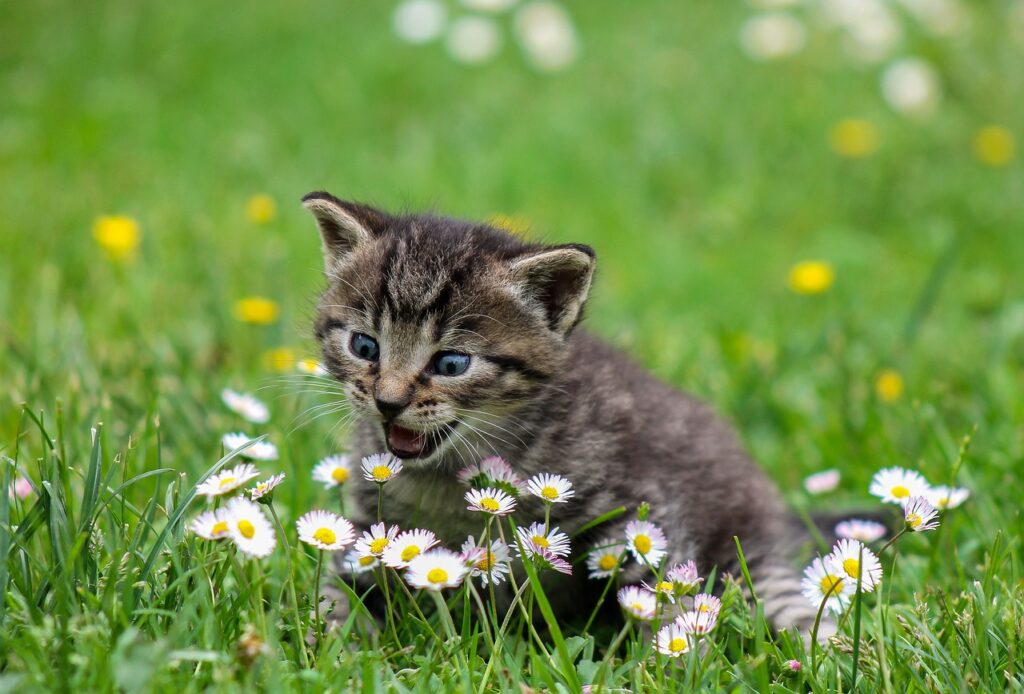Can Cats Eat Yogurt? – Yes, They Can
Cats can indeed enjoy a bit of yogurt now and then. However, this should be done with caution and in moderation. Yogurt, especially the plain, unsweetened variety, can be a safe treat for cats, offering them a source of probiotics which may be beneficial for their digestive system. But, remember that not all cats can tolerate dairy, and it’s essential to observe how your cat reacts to a small amount first.
Can Kittens Eat Yogurt?
With Caution, kittens may try yogurt. Like adult cats, some kittens may handle a minimal amount of yogurt, particularly if it’s plain and free of sweeteners. However, their tiny bodies are even more sensitive, and they primarily need mother’s milk or kitten formula. So, introduce it very slowly and watch for any signs of digestive upset.
Things to consider when feeding yogurt to kittens?
When feeding yogurt to kittens, it’s critical to ensure it doesn’t replace their essential nutrient intake from kitten-specific food. Yogurt should never be a meal substitute and always fed in tiny portions. Too much dairy can lead to diarrhea or upset stomachs in kittens, which are particularly vulnerable at a young age.
Nutritional Benefits of Yogurt for Cats – Why Yogurt is Good for Cats?
Probiotics
Probiotics in yogurt support a healthy gut by introducing beneficial bacteria. This can aid digestion and help maintain the right balance of gut flora in felines.
Calcium
Plain yogurt is a good calcium source which is vital for strong bones and teeth in cats.
Protein
Yogurt provides a source of protein, which is a critical component of a healthy diet for a cat, supporting their muscle growth and repair.
Fats
The fats in yogurt can supply energy and help keep a cat’s coat silky and healthy.
Hydration
Because many cats don’t consume adequate water, the moisture content in yogurt can help keep them hydrated.
Potential Allergies: Can Cats Be Allergic to Yogurt?
While not common, cats can be allergic to yogurt. Cats with a known lactose intolerance or dairy allergy should avoid yogurt entirely to prevent adverse reactions.
Symptoms of Yogurt Allergies in Cats
- Gastrointestinal Distress: Look for signs of vomiting or diarrhea after consuming yogurt.
- Skin Irritation: Allergic reactions may cause itching or redness on the skin.
- Respiratory Issues: In rare cases, a cat may exhibit wheezing or coughing after ingestion.
What to Do If Your Cat Shows Symptoms?
- Immediate Discontinuation: Stop feeding your cat yogurt and observe if symptoms improve.
- Veterinary Consultation: If symptoms persist, contact your veterinarian for advice and possible treatment.
- Dietary Review: Discuss with your vet alternatives to yogurt that provide similar benefits without the risk.
Recommended Amount: How Much Yogurt Can a Cat Consume?
Yogurt should be given to cats sparingly, no more than a teaspoon or two at a time and not every day. Choosing plain, unsweetened, lactose-free yogurt is the safest option to prevent any digestive problems.
Things to Consider When Feeding Yogurt to Cats
Always consider the individual tolerance and dietary needs of your cat before introducing yogurt. Monitor your cat’s response and consult with a vet if you’re unsure about the appropriate portion size.
How to Feed Yogurt to Cats: A Quick Guide
Yogurt can be a refreshing and nutritious treat for cats when fed responsibly. It’s a way to supplement their diet with probiotics and nutrients.
Simple Yogurt Dollop
Start with a small teaspoon of plain, unsweetened yogurt on top of their regular food or as a separate treat to assess their tolerance.
Frozen Yogurt Drops
Pour small drops of yogurt onto a baking sheet and freeze. Give these to your cat as a cool treat on a hot day, limiting the quantity as per the suggested amount.
Cat-Friendly Yogurt Parfait
Layer plain yogurt with a few pieces of cat-safe fruits like blueberries or melons. Ensure the fruit portions are minimal, and serve this special treat occasionally.
Conclusion
While yogurt is not a necessary part of a cat’s diet, it can be a wholesome treat when offered in moderation and with caution. Always choose lactose-free, plain, and unsweetened yogurt to avoid any potential health issues. Keep an eye on your cat’s reaction, and when in doubt, consult with a veterinarian for the best advice on incorporating treats like yogurt into your cat’s diet.



